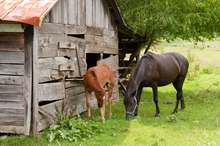In spite of cooling weather a new case of West Nile Virus, a mosquito-borne disease, has been reported in Hernando County, Florida. The disease was confirmed on the November 12th. The horse had no previous vaccine or travel history within the past 4 weeks and was euthanized due to poor prognosis. This is the second confirmed case in Hernando County and the 4th case in Florida since the beginning of the year.

Continuing threat of mosquitoes in horse pastures
In horses that become clinically ill with West Nile, the virus infects the central nervous system and causes symptoms of encephalitis and the fatality rate for horses exhibiting clinical signs is approximately 33%.
In horses that become clinically ill with West Nile, the virus infects the central nervous system and causes symptoms of encephalitis.
The case fatality rate for horses exhibiting clinical signs of WNV infection is approximately 33%. Data have supported that 40% of horses that survive the acute illness caused by WNV still exhibit residual effects, such as gait and behavioral abnormalities, 6-months post-diagnosis.
West Nile virus is transmitted from birds, often referred to as avian reservoir hosts, by mosquitoes, and infrequently by other bloodsucking insects, to horses, humans and a number of other mammals.
Horses and humans are considered to be dead-end hosts for West Nile Virus because the virus is not directly contagious from horse to horse or horse to human, and indirect transmission via mosquitoes from infected horses is highly unlikely as these horses do not circulate a significant amount of virus in their blood.
Prevention
Vaccination against the West Nile virus is the best method of prevention. A USDA licensed vaccine is recommended as a core vaccine and is an essential standard of care for all horses in North America.
Four USDA licensed vaccines are currently available (two are inactivated whole WN virus vaccines; one is a non-replicating live canary pox recombinant vector vaccine and one is an inactivated flavivirus chimera vaccine):
All of the current WN vaccine products carry one year duration of immunity, with challenge, consistent with their respective label claims.
In addition to a sound vaccination protocol recommended by a veterinarian, simple insect control measures should be utilized and insect repellents used when horses are in areas exposed to mosquitoes. Horses should be stabled during dusk and dawn hours and other times when mosquitoes are present and good use of fans to insure insects don't invade barn and stable areas is important
